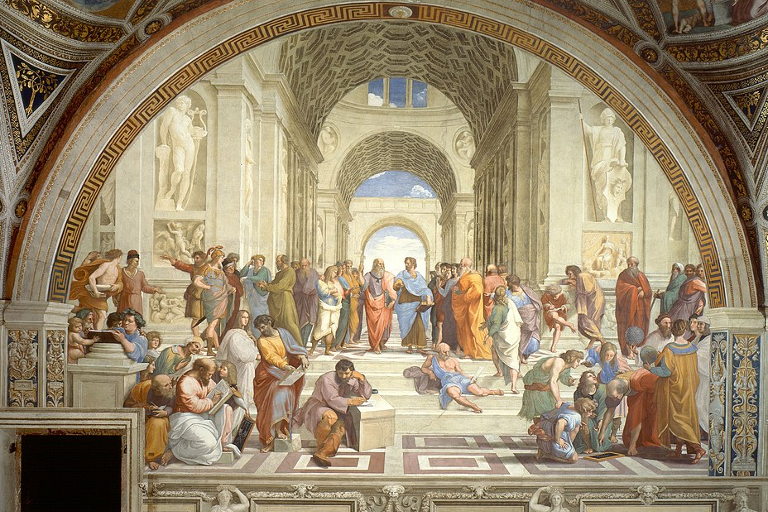I used to think that all the effrontery I found in the pages of philosophy was just fall-out from the Ass-Holocene. That most of the snobs who wrote this stuff never had to clean their laundry, disdained such menial labor, despised all those who did it. That they were just some of the more obnoxious snippets of A Man. And to some extent that might be true. Aristotle’s writing is painfully smug for someone who never learned to do anything useful, who hardly even sniffed the world beyond the Academy. To a mother and former school teacher, Nietzsche reads like a pampered and sniveling nine-year-old who never moved beyond his own litany of “I want, I feel, I think”. Thoreau told us all to live simply and do for ourselves but made his mother and sister climb that damned hill to bring him his laundry and a good number of his meals while relying on benefactors to pay for his needs.
Good work if you can get it.
And there is the problem. I don’t think philosophers are any more blindly self-absorbed than the rest of us. In fact, they may be less self-absorbed and less blind in many ways — except in the ways that would allow them to see their own privilege. The problem with philosophy — and much of the rest of the world of writing — is that writing is done by the privileged. It is edited and published by the privileged. It is selected and discussed and mostly read by the privileged. It is wholly bound up in the world of privilege and has little experience with the world of the practical.
To begin with it takes time to do this writing thing, time that can’t be spent baking the daily bread and tending to the chicken coop and garden and children and, and, and ad infinitum… It takes years of reading and education to come to the point where you believe you might have something original to contribute (except in the Asshole case — because, of course, Assholes are smarter than the rest of us plebs from birth). It takes money and support from others to be a writer, and even when there is recognition of that — as in the case of most recent philosophy and nearly all feminist writing — philosophers don’t feel the scope of their privilege. There are still blind spots. When they write about lives that lack that privilege, their writing comes from outside that place and is accordingly missing out on most of the lived detail.
I started reading Carl Von Essen’s Ecomysticism a couple days ago. I almost put it back down again. This is one of those lovely books that tells us we need to be closer to the other-than-human world in order to be fully human. It is written by a sensitive and lovely man whose kindness and care for the world is evident in every carefully chosen word. And yet… He talks about competition and violence and killing as though these were inevitable, driving characteristics in humans and in society. As though humans would have survived if they were natively aggressive and bellicose. As though any species can survive without deep interpenetrating cooperation and radical interdependence. This is the major blindness of A Man — approximately the only species that can and does depend upon competition for survival because his true needs are met by others. Often completely beneath his awareness. So, to the aware, this colors all the rest of the writing. If you got that wrong, what else is wrong with your thinking? And what is wrong is often that the writing comes from a position of privilege and is lacking in understanding of anything lacking that privilege. Von Essen is a caring human. But he doesn’t see how people truly live. So how can he prescribe ways of living with any authority?
This is the problem of privilege and power over. It is blinding. A person living that privileged life does not have any practical experience with the world that the rest of us inhabit. They have never had to work for wages for forty to sixty hours a week just to pay rent and maybe eat now and then. They spend most of their time competing for status and don’t understand that this is not work, nor anything like wage work. They don’t have to juggle demands on their time and efforts, and they face few hard consequences when they choose to sit down with a pen rather than address all the other pressing needs. They get to make that choice. They get to make choices generally. Choice is not a thing for those without privilege. Time is not something we can dole out according to our wants. Our time is taken from us, from the moment we wake until the very late moment we fall asleep — and we don’t even get to choose how much of that we get. Wage work absorbs much of our time. Tending to our bodily needs and those of our dependents uses the rest.
Here’s an illustration of the gap between privilege and the real world. I’ve read caring people talk about their choice to fly — some wringing their hands, some just dismissing the guilt with a shrugging “well, that’s how life is today” — and yet they never seem to comprehend that most of the people in the world never get to make that choice because they never have time to go anywhere and would not have the extravagant money necessary to do so if they had the time. The privileged don’t see that air travel is a choice of the wealthy and only the wealthy, a completely unnecessary choice, no matter how they choose to rationalize their decision. Obviously unnecessary, because most of the world lives without it. (Soapbox: Therefore it would be really easy to eliminate that rather high carbon stream if the wealthy would just choose to stop flying.) Privilege has blinded them to their choice in the matter — to the point where they truly believe that they don’t have a choice.
If every philosopher was forced to spend at least a year without privilege, living paycheck to paycheck, washing their own laundry and feeding their own kids (and/or maybe someone else’s kids), I suspect there would be radically different answers to the question of how we should live. For starters, there would be less philosophy written. Probably more calls for doing away with wage work and doing more direct tending to real needs. I suspect that a good deal of navel-gazing would just fall away. It is rather embarrassing to read about superman from a man who could literally do nothing for himself. I’m sure it would be very embarrassing to write about ME if that pedestal of privilege were removed. Without the blindness of privilege it becomes painfully obvious that your navel is just not that important when there are chickens that need feeding.
The problem with philosophy is that those who write it have never had to do anything. They’ve lived in a world rich in choices. They have likely lived absorbed in A Man’s world of competition over empty status symbols and have never actually had to do the real work of cooperative living. The problem with philosophy is the blindness of insulating wealth and the lack of practical, visceral experience with the real world of demands on time and resources, of lack of choice, of hard and fast consequences. The problem of philosophy is that they just don’t understand what they don’t see — and they don’t see much, isolated as they are from much of living. The problem with philosophy is privilege.
Teaser photo credit: Aristotle and Plato at the Academy. A whole lot of white guys not doing very much.
Painted through the lens of a white guy who didn’t do very much.
(Raphael, School of Athens, Wikimedia Commons)





